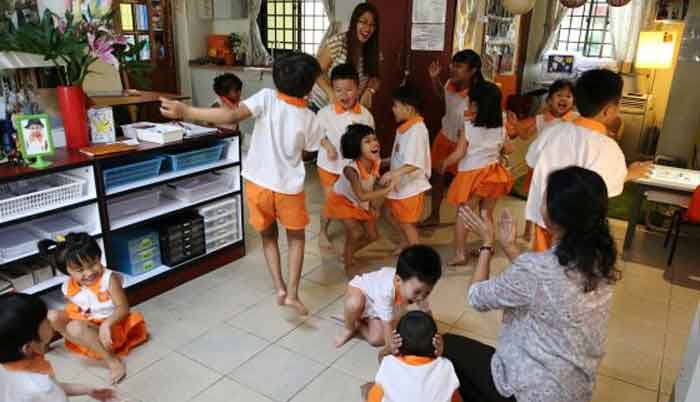![]() Home > Singapore
Home > Singapore
Centre Focuses On Helping Vulnerable Children through Play-Based Learning

Teachers and children are seen at Child At Street 11 which has been providing pre-school education for kids from low-income and dysfunctional families, picture taken Jan 5, 2017. | PHOTO: Koh Mui Fong/TODAY
![]() January 9th, 2017 | 09:49 AM |
January 9th, 2017 | 09:49 AM | ![]() 1516 views
1516 views
SINGAPORE
With her classes stretching until the evenings on most days and her husband, a computer technician, on the night shift, Ms Durga Devi Marimuthu, 26, often worries about being too late to pick up her children, both seven, from their childcare centre.
At times, the teachers have also stayed as late as 9pm, just so they can squeeze in extra time to coach her children in reading or writing, before she and her children head home to their two-room rental flat.
Things can get difficult, as she has epilepsy and is declared medically unfit to work, while her husband brings home a salary of S$1,200. But seeing her children, who initially struggled in their learning, blossom under their teachers’ watch has taken some of the load off her shoulders.
“(The teachers here) are very understanding, even if I come at a later time to pick up them up ... And if my children have problems reading or writing, they’ll stay back to (help), or encourage and motivate me,” she said. “It’s proved me wrong — it’s not just a centre that (is open for certain hours).”
Tucked away in the corner of Block 102 Ang Mo Kio Avenue 3, Child at Street 11 may seem like an ordinary childcare centre.
Unbeknownst to many, however, the teachers toil quietly, their efforts mostly under the radar despite the centre being around since April 1999.
Catering to children aged 18 months to six years, with an after-school programme for alumni aged seven to 12 years, the centre is dedicated to helping a large proportion of its children who come from vulnerable households.
While full-day care costs S$650 a month, those needing assistance pay less, as the fees are adjusted according to the family’s financial ability, said Ms M Nirmala, the centre’s chief executive. About 70 per cent of its 58-strong cohort of students pay between S$3 and S$70 monthly.
To do this, the centre raises about S$250,000 yearly to subsidise its programmes, with the help of donors like Morgan Stanley, Singapore Pools, Spanish Speaking Women’s Association, Ikea and Woh Hup.
“We don’t look at (whether we) can afford to take the child in ... We just (take) in the child, so in that sense, we’re needs-blind,” said Ms Nirmala.
There are no worksheets, homework or spelling lists. The centre subscribes to the ethos of play-centred learning instead.
The children fashion their own treehouse models, learn mathematical concepts by estimating length or counting the number of gates at the Istana, for instance, or using measuring tape and shoeboxes to reconstruct the length of a sperm whale spotted floating off Jurong Island.
“The buzzword now is play,” explained Ms Nirmala. “But it’s not about just (children) jumping here or there ... Play is high-level brain learning.”
In another instance, spurred by the death of a dragonfly, the children organised a “funeral service” last year, with a parent digging the grave and the children even designing a death certificate for the creature.
“(People) thought it was a joke ... (But to us), it (shows) a deep level of thinking about death and respect (for life),” said principal Shanti de Mello.
To give the children more exposure, the school organises a mix of activities: They have visited the Istana and the trading floor at Morgan Stanley. They have also mingled with international guests, with visits from United States Navy officers and flamenco dancer Antonio Vargas and weekly sessions with United World College of South East Asia students.
“When they go to places of importance (and) beauty, they start to think ‘I can be a policeman in Istana’, for example. Their aspirations and targets change ... (so) the learning doesn’t just come from the teachers, but from many people,” said Ms Nirmala.
From these experiences, the school recently launched its annual book by the six-year-old graduating class, consisting of a collection of 12 essays brimming with ideas and artwork around themes like nation and identity.
But it is not always easy dealing with families of varying circumstances. The staff must show flexibility and sensitivity, be it by using methods such as drawing to calm children with emotional and behavourial issues or working with families to look after the children’s hygiene or healthcare, noted Ms Shanti.
She added: “With this kind of background, it’s important to make parents feel comfortable, valued and, above all, respected. (We) must be careful with the choice of words when we (talk) to them, as parents might feel cornered or become defensive and aggressive.”
Part-time cabbie Jimi Lim, 63, said his wife was initially worried that their son had no worksheets or spelling lists, but they eventually warmed to the idea and found their son to be more outgoing and confident.
He added: “The (children) are not just confined to homework and academics ... Here, they can let loose, interact with other children and the outdoors.”
Source:
courtesy of TODAY
by Toh Ee Ming
If you have any stories or news that you would like to share with the global online community, please feel free to share it with us by contacting us directly at [email protected]